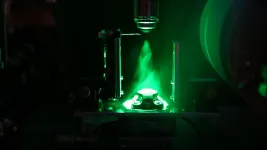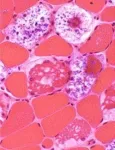Older adults most likely to make the effort to help others
2021-04-16
(Press-News.org) Older adults are more willing to make an effort to help others than younger adults, according to new research from the University of Birmingham.
The study, led by researchers in the University's School of Psychology, is the first to show how effortful 'prosocial' behaviour - intended to benefit others - changes as people get older. In particular, it focused on people's willingness to exert physical effort, rather than to give money or time, since attitudes to both these are known to change with age. The research results are published in Psychological Science.
In the study, the research team tested a group of 95 adults aged between 18 and 36, and a group of 92 adults aged 55-85. Each participant made 150 choices about whether or not to grip a handheld dynamometer - a device for measuring grip strength or force,- with 6 different levels of how hard they had to grip. Before the experiment, the researchers measured each person's maximum grip strength, so they could make sure that the effort people had to put in was the same for everyone, and not affected by how strong people were.
For each decision, participants were told whether they would be working to gain money for themselves, or for another person. First they were asked to decide whether they would be willing to put in effort to gain money or not. If they accepted the offer they had to grip hard enough to get the money.
The results showed that when the task was easy, young and older adults were equally willing to work for others, but, when the task was more effortful older adults were more willing to work to help others. In contrast, younger adults were more selfish and were much more likely to put in higher levels of effort to benefit themselves.
The team also noticed a correlation between the willingness to put effort into tasks that benefited other people and positive feelings towards other people. But it was only in younger people that this 'warm glow' feeling also related to them completing tasks for themselves.
Senior author, Dr Matthew Apps, explained: "Past research had suggested that older adults were more prosocial than young adults because they donate more money to charity. But, the amount of money or time people have available changes a lot as we get older, as such older adults might just appear more prosocial. We wanted to focus simply on people's willingness to exert effort on behalf of someone else, as this shouldn't depend on your wealth or the time you have available. Our results showed very clearly that participants in our older age group were more likely to work harder for others, even though they would gain no significant financial reward for themselves."
Lead author Patricia Lockwood added: "A lot of research has focused on the negative changes that happen as people get older. We show that there are positive benefits to getting older too, in particular older adults seem to be more willing to put in effort to help others. These 'prosocial behaviours' are really important for social cohesion. Understanding how prosocial behaviour changes as people get older is critical as we predict the impact of an ageing society."
INFORMATION:
The research was funded by the Biotechnology and Biological Sciences Research Council and the Medical Research Council, both part of UK Research and Innovation.
ELSE PRESS RELEASES FROM THIS DATE:
2021-04-16
WASHINGTON, April 16, 2021 -- Early in the COVID-19 pandemic, doctors recognized that patients who developed a "cytokine storm" -- a surge of pro-inflammatory immune proteins -- were often the sickest and at highest risk of dying. But a cytokine storm can also occur in other illnesses, such as influenza. Today, scientists report preliminary results on a sweat sensor that acts as an early warning system for an impending cytokine storm, which could help doctors more effectively treat patients.
The researchers will present their results today at the spring meeting of the American Chemical Society (ACS). ACS Spring 2021 is being held online April 5-30. Live sessions will be hosted April 5-16, ...
2021-04-16
Encoding information into light, and transmitting it through optical fibers lies at the core of optical communications. With an incredibly low loss of 0.2 dB/km, optical fibers made from silica have laid the foundations of today's global telecommunication networks and our information society.
Such ultralow optical loss is equally essential for integrated photonics, which enable the synthesis, processing and detection of optical signals using on-chip waveguides. Today, a number of innovative technologies are based on integrated photonics, including semiconductor ...
2021-04-16
Researchers at Aalto University have developed a new device for spintronics. The results have been published in the journal Nature Communications, and mark a step towards the goal of using spintronics to make computer chips and devices for data processing and communication technology that are small and powerful.
Traditional electronics uses electrical charge to carry out computations that power most of our day-to-day technology. However, engineers are unable to make electronics do calculations faster, as moving charge creates heat, and we're at the ...
2021-04-16
Vitamin D deficiency may impair muscle function due to a reduction in energy production in the muscles, according to a mouse study published in the Journal of Endocrinology. Vitamin D deficient mice were found to have impaired muscle mitochondrial function, which may have implications for muscle function, performance and recovery. This may suggest that preventing vitamin D deficiency in older adults could help maintain better muscle strength and function and reduce age related muscle deterioration, but further studies are needed to confirm this.
Vitamin D is a hormone well known to be important for maintaining bone health and preventing ...
2021-04-16
Douglas Wilbur '14, a visiting Ph.D. scholar in the Department of Communication at UTSA, has published a study that shows how researchers can craft message campaigns to protect individuals from adopting extremist views.
According to his research, when people are explicitly told that they are free to accept or reject propagandistic claims, the likelihood of choosing a moderate view increases. This was a result of a survey of attitudes that tested counter-propaganda strategies, which stressed a person's autonomy, and then measured sentiments after exposure.
The study was ...
2021-04-16
Sophia Antipolis - 16 April 2021: Working hours that deviate from an individual's natural body clock are associated with greater cardiovascular risk, according to research presented at ESC Preventive Cardiology 2021, an online scientific congress of the European Society of Cardiology (ESC).1
"Our study found that for each hour the work schedule was out of sync with an employee's body clock, the risk of heart disease got worse," said study author Dr. Sara Gamboa Madeira of the University of Lisbon, Portugal.
At least 20% of European employees work atypical hours or shifts,2 and growing scientific evidence associates these with deleterious cardiovascular outcomes.3 A number of explanations ...
2021-04-16
Rare diseases are sometimes the most difficult to treat because of a lack of research and fewer participants to study.
An example would be those who have Pompe disease, a genetic condition when a body can't make a protein that breaks down a complex sugar, called glycogen, for energy. Too much glycogen builds up and damages muscles and organs. The disease causes muscle weakness and trouble breathing and can affect the heart and muscles.
In the case of Pompe disease, however, University of Cincinnati researchers have found a newer, more effective treatment for the rare condition that could become the new standard of care.
Hani Kushlaf, MD, an associate professor in both the Department of Neurology and Rehabilitation Medicine and the ...
2021-04-16
COVID-19 needs no introduction. Last year, the disease, which is caused by the virus SARS-CoV-2, reached every continent across the globe. By the end of March 2021, there had been an estimated 128 million cases recorded with almost three million of these being fatal. As scientists' race to develop vaccines and politicians coordinate their distribution, fundamental research on what makes this virus so successful is also being carried out.
Within the Mathematics, Mechanics, and Materials Unit at the Okinawa Institute of Science and Technology Graduate University (OIST), postdoctoral researcher, Dr. Vikash Chaurasia, and Professor Eliot Fried have been using energy minimization techniques to look at charged proteins on biological particles. Previously they researched ...
2021-04-16
Researchers from University of British Columbia, Emory University, and New York University published a new paper in the Journal of Marketing that investigates the relationship between branding and counter-marketing in the cigarette industry.
The study, forthcoming in the Journal of Marketing, is titled "Investigating the Effects of Excise Taxes, Public Usage Restrictions, and Anti-Smoking Ads across Cigarette Brands" and is authored by Yanwen Wang, Michael Lewis, and Vishal Singh.
While the goal of marketing is usually to boost purchase rates and strengthen relationships between consumers and brands, counter-marketing is an increasingly common strategy for reducing the consumption of "vice" goods such as cigarettes. Counter-marketing activities may ...
2021-04-16
A past COVID-19 infection does not completely protect against reinfection in young people, according to an observational study of more than 3,000 healthy members of the US Marines Corps most of whom were aged 18-20 years, published in The Lancet Respiratory Medicine journal.
The authors say that despite previous infection and the presence of antibodies, vaccination is still necessary to boost immune responses, prevent reinfection, reduce transmission, and that young people should take up the vaccine wherever possible.
In the study, between May and November 2020, around 10% (19 out of 189) of participants who were previously infected with SARS-CoV-2 (seropositive) became reinfected, compared with new infections in 50% (1,079 out of 2,247) ...
LAST 30 PRESS RELEASES:
[Press-News.org] Older adults most likely to make the effort to help others




